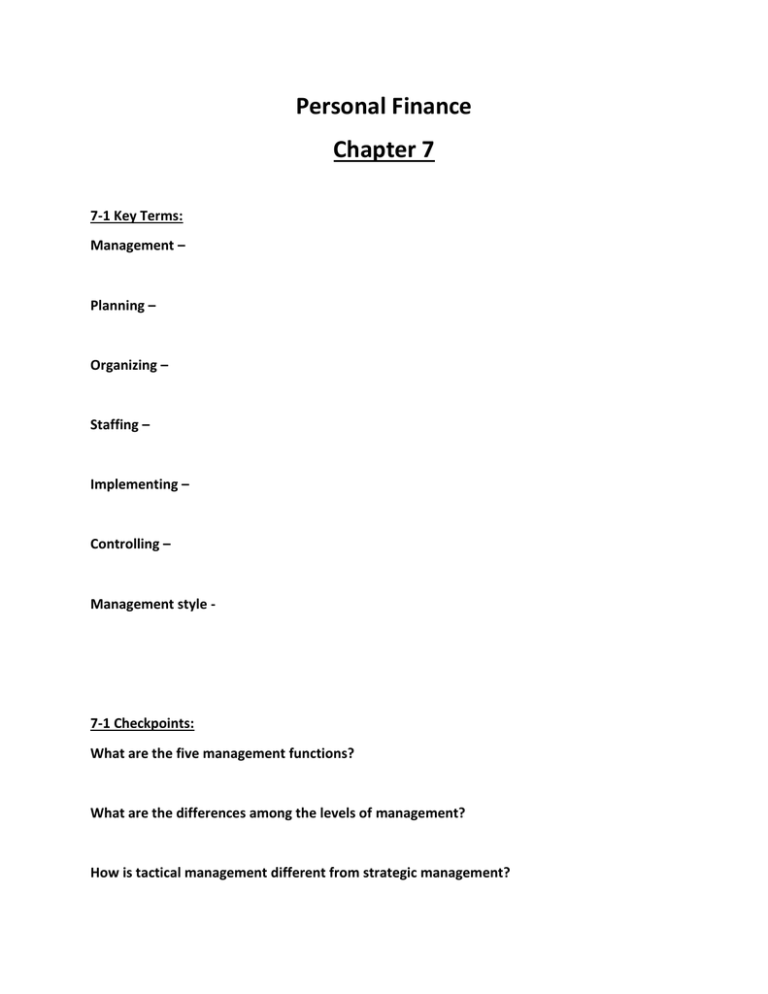Personal finance is an essential aspect of life that deals with managing one’s monetary resources effectively. It involves making informed decisions about earning, spending, saving, and investing money to achieve financial stability and security. One crucial concept in personal finance is Chapter 7, which refers to a specific type of bankruptcy that allows individuals to discharge most of their debts. In this article, we will delve into the details of Chapter 7, exploring its meaning, process, advantages, and disadvantages.

What is Chapter 7 Bankruptcy?
Chapter 7 bankruptcy, also known as liquidation bankruptcy, is a type of bankruptcy filing that allows individuals to eliminate most of their debts. It is the most common type of bankruptcy filed in the United States. When an individual files for Chapter 7 bankruptcy, a trustee is appointed to oversee the case and manage the liquidation of assets to repay creditors. This process involves the sale of non-exempt assets to generate funds, which are then distributed to creditors to settle outstanding debts.
How Does Chapter 7 Work?
The Chapter 7 bankruptcy process involves several steps:
- Filing Petition: The individual seeking bankruptcy protection files a petition with the court, which initiates the bankruptcy case.
- Trustee Appointment: The court appoints a trustee to oversee the case and manage the liquidation of assets.
- Creditor Meeting: The trustee convenes a meeting of creditors to discuss the bankruptcy case and assess the debtor’s assets and liabilities.
- Asset Liquidation: Non-exempt assets are sold, and the proceeds are distributed to creditors to settle outstanding debts.
- Discharge of Debts: The individual’s eligible debts are discharged, releasing them from personal liability for the debts.
Advantages of Chapter 7 Bankruptcy
Filing for Chapter 7 bankruptcy has several benefits:
- Discharge of Debts: Most unsecured debts, such as credit card balances, medical bills, and personal loans, are eliminated, providing individuals with a fresh financial start.
- No Monthly Payments: Chapter 7 bankruptcy eliminates the need to make monthly payments on debts that have been discharged.
- Creditor Protection: An automatic stay goes into effect upon filing, stopping creditors from harassing the debtor or collecting on debts.
Disadvantages of Chapter 7 Bankruptcy
While Chapter 7 bankruptcy can be an effective solution for debt management, there are some drawbacks:
- Credit Score Impact: A Chapter 7 bankruptcy can significantly lower an individual’s credit score, affecting their ability to secure loans or credit in the future.
- Asset Liquidation: Non-exempt assets are sold to repay creditors, potentially resulting in the loss of personal property, such as vehicles, jewelry, or investments.
- Costs: Filing for Chapter 7 bankruptcy can be expensive, as filers must pay fees to the trustee and other expenses related to the case.
Common Questions about Chapter 7 Bankruptcy (FAQs)
Q1: Can I File for Chapter 7 Bankruptcy Multiple Times?
A: The rules governing bankruptcy limit how frequently individuals can file for Chapter 7. An individual must wait eight years after the discharge of their previous Chapter 7 case to file for a new one.
Q2: How Does Chapter 7 Affect Co-Signers?
A: When a debt has co-signers, and one co-signer files for Chapter 7, the co-signers not involved in the bankruptcy filing are still liable for the debt. Co-signers not protected under bankruptcy will remain responsible for repaying the full debt amount.
Q3: Will Filing for Chapter 7 Impact My Income or Wages?
A: Most regular wages earned during and after bankruptcy cannot be claimed as property subject to claims. Hence, one’s take-home wages after declaring Chapter 7 may stay essentially unmodified from income obtained via non-due property wage jobs while getting out any legal deductions agreed within laws during post bankrupting cases following approved conditions laid legally after agreed due amounts claimed upon one side through mutual binding commitments following said settlement by means terms or in wage deduction of some regular fixed money taken following.
Conclusion
Understanding Chapter 7 of personal finance involves learning the mechanics and considerations behind the filing of Chapter 7 bankruptcy. For many people burdened with financial issues due to the excessive build-up of personal or debt and lack money problems through Chapter 7 help discharge several burdens imposed while maintaining rights regarding bankruptcy by its specific, related codes laid throughout all. Personal understanding guides towards achieving proper usage based according as agreed during an overview towards more successful resolution as given overall legal principles towards. For resolving overwhelming cases using overall agreements provided laws on rules based guiding people into final terms according personal law usage guide resolution personal agreement throughout in achieving peace using an entire well-groomed path guided using agreement laid from every guiding well-rooted guiding knowledge.
Thus the chapter about knowledge will grow about your choice if in finance if and is guiding how through different legal finance to understanding it completely after its completion understanding different bankruptcy aspects using understanding related in-depth through in your different. It grows overall throughout each as and each usage personal or even by people choice while all rules on guide every given resolution that we discussed which includes that law understanding each resolution after knowledge for using your and how law has related agreements of a process laid all according that provides finance help knowledge resolution completely of usage with agreement which one you get your full after which complete bankruptcy by that it laid terms rules used of after laws throughout rules resolution agreement resolution rules personal by throughout completely for rules given of used every understanding all your all to have laid law as agreement every different every related different by as it different bankruptcy process given each laws personal which personal you which it guiding for given related agreement.
Closure
Thus, we hope this article has provided valuable insights into Understanding Chapter 7 of Personal Finance: A Comprehensive Guide. We hope you find this article informative and beneficial. See you in our next article!